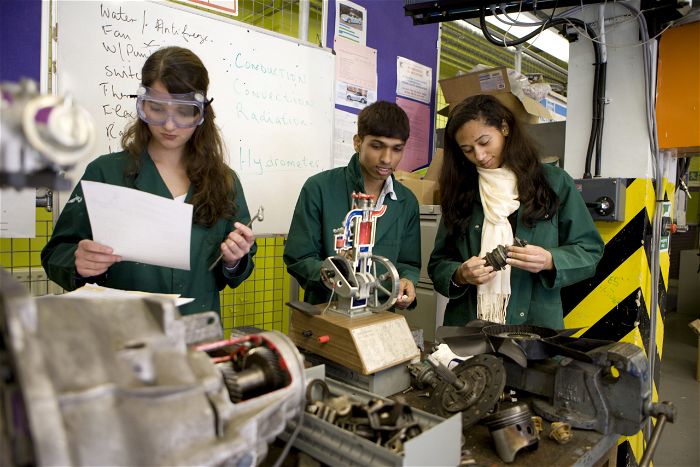

America’s “Greatness” Depends on the Skills of Its People and Its Workforce
May 30, 2017
At a Glance
Last week, the Trump administration released its proposed budget for Fiscal Year 2018, entitled “ A New Foundation for American Greatness .” The President’s proposal would prioritize funding for defense, border security and immigration enforcement, infras
Last week, the Trump administration released its proposed budget for Fiscal Year 2018, entitled “A New Foundation for American Greatness.” The President’s proposal would prioritize funding for defense, border security and immigration enforcement, infrastructure, and technology. What the budget does not prioritize is investing in the education and skills of America’s current and future workforce. If enacted, the funding cuts in the budget would represent a serious threat to America’s economic prosperity and to the greatness the administration is looking to achieve.
The United States needs bold and scalable solutions to harness the enormous untapped talent and potential of all Americans. Economic development and job creation investments will be essential for helping distressed communities generate new employment opportunities. Talent development is critical for ensuring economic opportunity and mobility, as Americans’ economic success is increasingly tied to their education and skill levels.
While the U.S. economy has certainly improved since the great recession, far too many Americans are still without jobs, and far too many employers cannot find the skilled workers they need to remain competitive. Our current unemployment rate translates to 7.1 million Americans who are looking for work, with approximately 2 million of those individuals among the long-term unemployed. Sadly, these numbers do not include the many Americans who have given up searching for work, who are discouraged, underemployed, or who are marginally attached to the labor force.
Workers who are entering the job market for the first time or are looking to return will encounter a very different environment in the kinds of jobs and the skills required than existed in the past. According to Georgetown University’s Center on Education and the Workforce:
- The percentage of U.S. jobs requiring postsecondary education and training is expected to reach a new high of 65 percent in 2020.
- By 2020, the United States is projected to face shortages of 3 million workers with associate’s degrees or higher and 5 million workers with technical certificates and credentials.
- Thirty-six million Americans have low basic skills limiting earnings without further education and training.
The workers currently unemployed or underemployed face multiple barriers and are in need of more intensive assistance to find family-supporting careers. This argues for increased investments in America’s education and skills development—not disinvestment.
The administration justifies the proposed cuts to skills and workforce development, in part, by calling for a shift in responsibility for funding these services to states, localities, and employers. While strong, aligned, public and private investment in our nation’s workforce is critical to our collective economic success, “passing the buck” is not the answer. There is no doubt that greater efficiencies can be realized in the current workforce system. However, the appropriations process is not the place to drive that broader conversation.
The administration’s budget calls for massive cuts in funding for programs ranging from workforce development, to career-focused and higher education, to poverty alleviation programs. Specifically, the budget calls for:
- A 38 percent reduction in funding for the nation’s training and employment programs that assist dislocated workers, low-income and underprepared adults, and youth;
- A 14 percent cut in funding for career and technical education state grants;
- A 16 percent cut for adult education state grants, providing basic education, literacy, and English language education for our most underprepared populations;
- Devastating reductions in federal student aid funding, including a 49 percent cut in the Federal Work-Study program and significant reductions in Pell and guaranteed student loan programs; and
- Proposed legislative changes that would seriously reduce funding for poverty alleviation programs such as Temporary Assistance for Needy Families, the Supplemental Nutrition Assistance Program, and multiple other grants that provide assistance to low-income individuals.
These cuts, if enacted, would have a direct and immediate impact on the education and employment opportunities and outcomes for millions of Americans. Instead of pulling back from critical education and workforce development programs, we should be investing more to help to drive the engine of our economy and meet the demands of the jobs of the future.
In his remarks last week, Office of Management and Budget Director Mick Mulvaney stated that the administration wants to “measure compassion, true compassion, by the number of people we help get off those programs.” We would argue that providing opportunity is the fundamental goal of strong, smart federal investments in workers and learners. These programs should not be seen as government handouts, but as critical stepping stones that enable individuals to take the steps needed to attain meaningful employment and support their families.
Fortunately, the president’s proposed budget is just the first step in the process of funding federal programming, and we look forward to working with Congress in the coming months to advance our shared priorities of ensuring that all Americans have the skills and credentials needed to succeed in our economy and that we do everything we can to ensure individual and collective prosperity and continued U.S. greatness.
AP Photo/Carolyn Kaster
